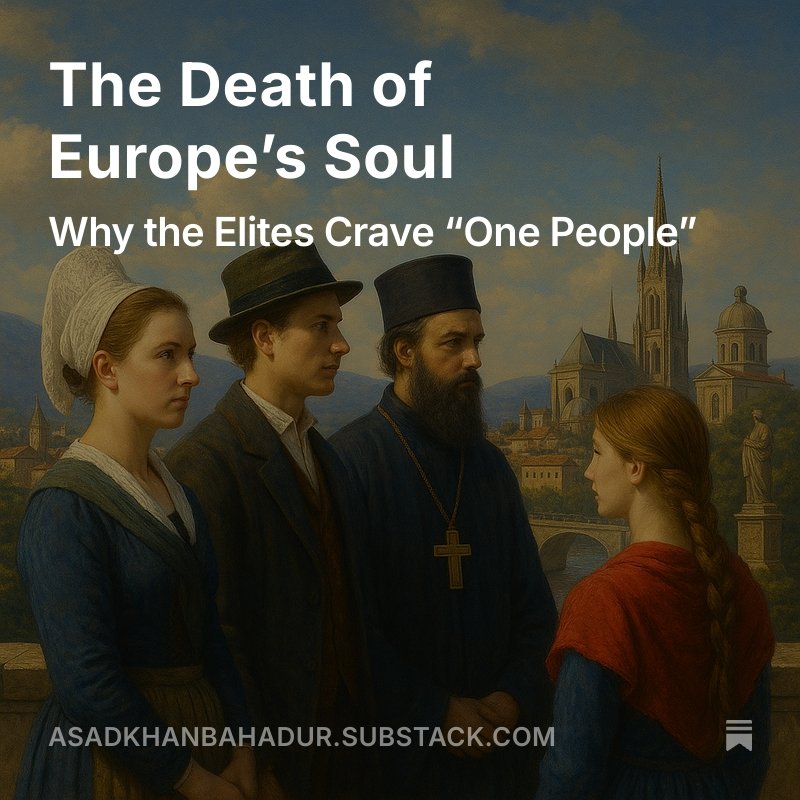Why the Elites Crave “One People”

“A Breton is not a Bavarian. A Greek is not a Swede. And that is not a problem — that is Europe.”
Yet somewhere between the ruins of the Second World War and the green glass of the European Parliament, this truth was forgotten.
Modern Europe is in the grip of an ideological fever — the belief that diversity is dangerous, and uniformity is peace. Brussels dreams of a singular European people: equal, secular, eco-conscious, urban, multilingual, and uprooted. They want Erasmus over Aristotle, DEI over Dante, and carbon quotas over cathedrals. The question is: why?
Enlightenment and the Cult of the Universal
To understand the madness, we must begin with the Enlightenment. This period, often hailed as Europe’s finest intellectual flowering, birthed a dangerously seductive idea: that universal reason could replace particular traditions.
The 18th-century philosophers believed human identity could be rationalized and engineered. Strip away the languages, flags, and old religions — and what remains is the abstract, perfect “citizen.” That ideal still haunts the minds of European elites. A German is no longer someone tied to the Rhine, to Goethe, to Bach — but to Brussels, the Euro, and Net Zero compliance.
In this way, Europe’s “One People” dream is less about unity and more about erasure. Identity becomes an inconvenience to be redesigned.
The Political Convenience of Homogenization
Let’s be honest: bureaucracy hates difference.
You cannot govern twenty-seven fiercely proud nations — with their own cuisines, saints, grudges, and dialects — with a single currency, a single court, and a single migration policy. So, instead of adjusting policy to suit the people, they adjust the people to suit the policy.
The European Union thrives on the abstraction of a pan-European identity because it flattens the terrain. Nationalism is unpredictable. Populism is chaotic. But an emotionless, cosmopolitan consumer-voter? That’s manageable.
Hence the quiet war on tradition: local languages vanish, statues come down, liturgies fade, and family ties loosen — all replaced by the IKEA uniformity of EU values. These are not values rooted in heritage. They are procedural, performative, and ultimately shallow.
From Auschwitz to Amnesia
Another root lies in Europe’s collective trauma. The 20th century was drenched in blood — much of it justified in the name of nationalism. The Holocaust, the Balkan wars, the Iron Curtain — all scars on the soul of Europe.
In response, the continent overcorrected. Identity became taboo. Culture became kitsch. National memory was replaced by guilt, shame, and a desire to dissolve boundaries altogether.
But in running from the past, they ran too far. Europe stopped believing in itself. Not just in its gods and myths, but in its right to exist as a civilization, distinct and proud. This spiritual vacuum was then filled by a sterile technocracy that speaks in legalese, runs on grants, and dreams in diversity reports.
Post-Christian Europe and the Loss of the Sacred
Without Christianity, Europe lost its soul.
Not just its churches and saints, but its symbolic language: sin, redemption, the eternal. The cathedral was replaced by the bank. The stained-glass window by the spreadsheet. Europe no longer asks why — only how.
And in this hollow space, the elites whisper the gospel of the new age: equality without roots, tolerance without truth, humanity without history. The “One People” is their messiah. But messiahs without mystery become tyrants.
Europe’s True Beauty: Ordered Diversity
The true miracle of Europe was never its sameness — it was its harmony in difference.
The chaos of Italian marketplaces. The silence of Nordic forests. The mystical chants of Mount Athos and the existential brooding of Berlin cafés. This was never a weakness. It was the very architecture of European genius — a mosaic, not a monolith.
A Europe that forgets its own texture is not creating peace. It is committing cultural euthanasia.
Who Will Remember Europe?
What is left when all the borders are erased, all the churches turned into hostels, all the languages reduced to English and bureaucracy?
You will have a continent, yes — but not a culture. A map, but not a myth. A people, but not a purpose.
Europe’s tragedy is not just that it is dying. It is that it is dying quietly, by design — killed not by war, but by forgetfulness.
The old Europe — mystical, wild, contradictory, glorious — lives only in the memories of those who dare to remember.
Subscribe to my Substack to read more articles.
https://substack.com/@asadkhanbahadur
Post a comment Cancel reply
You must be logged in to post a comment.
Related Posts
The Ban, the Bridge, and the Bargain: Pakistan’s Sudden Return to the Limelight
U.S. terror designations, KP operations, and back-to-back White House outreach signal a transactional reset with…
We Were Chosen And We Failed
We Were Chosen And We Failed The world today is not merely in chaos —…
When the Guardians Pillage the Treasury
In 2013, a new political force entered the corridors of power in Khyber Pakhtunkhwa (KPK),…
The Middle Path to Hell
The Middle Path to Hell A lament on the failure of justice, the corruption of…




